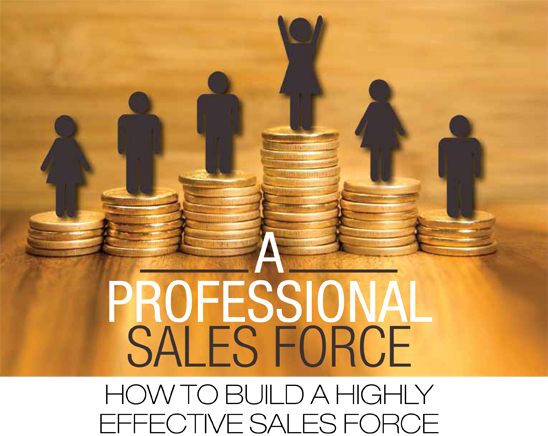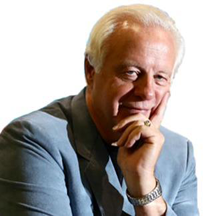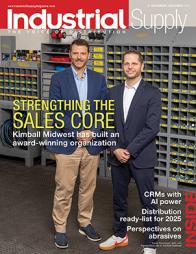A Professional Sales Force

By Dave Kahle
It’s one of the most common laments I hear from CSOs: “I wish I had a more professional sales force.”
No doubt that thought has passed through your mind at some time in the recent past. You’re not alone, of course.
Let’s take a look at what it really means, why it is such a common malady, and what you can do about it.
First, let’s acknowledge that there are individual salespeople who are very professional. I have personally met and worked with literally hundreds, if not thousands of them. There is, scattered about, an occasional company that can honestly boast of a highly professional sales force.
If you happen to be one of the highly professional, please don’t take offense. I’m not talking about you. You are an inspiration and encouragement to me as well as a pleasure with which to work. Having said that, please understand that the vast majority of your colleagues do not share your professionalism. They, not you, are the focus of this article. What does it mean to be a “professional salesperson?”
Four Basic Characteristics of a Professional Sales Force
1) A professional salesperson strives continually to do a good job.
This sounds so simple, but it is often the first complaint I hear. The world is full of salespeople who have plateaued at a certain average level of performance and are content to remain there. Too many sales people are satisfied with just doing the job, with mediocre performance. Why? Because they don’t see it as a profession, they see their work as a job, a necessary inconvenience that fills the work week and provides a paycheck.
The professional salesperson sees the job as a challenge to continually strive for greater performance and more personal growth. He/she understands that professionalism demands a commitment to excellent performance, and strives to deliver.
2) A professional salesperson is a good employee.
I wish I had a dollar for every salesperson I’ve run across who thinks of himself as an independent business person with no compulsion to follow the company’s directions. They consider themselves outside of the world defined by the policies, strategies, goals and procedures of their employer. Believing that their relationships with their customers are unshakeable and personal, they provide lip service to their manager’s directions and go about their jobs as they see fit. They mistakenly equate experience with competence. Tacky. Misguided. Unprofessional.
3) A professional salesperson is committed to personal growth.
Every profession in the world expects a minimum degree of competence to enter the profession. That’s why lawyers must pass the bar exam, ministers and social workers must graduate from college, teachers must pass their student teaching experience, and EMT technicians must pass their exam to be certified.
Not only does every profession have minimum requirements, so too every profession then demands the continual improvement of those practitioners who are dedicated to that profession. That is why lawyers have conferences, nurses and teachers have in-services, doctors take advanced training, etc.
High standards and continuous improvement are the characteristics of every profession. While we may be a generation away from universally requiring minimum standards in our entry-level salespeople, we can certainly expect those who make their living by this means to regularly invest in their own improvement. From my experience, I’m convinced that only five percent of the salespeople in the world have spent $20 or more of their own money on their own improvement in the past 12 months. That’s an indication of the degree to which they are committed to personal and professional growth. The professionals do. The non-professionals don’t.
4) Professional salespeople are individuals of substantial character.
You just don’t expect foul language, coarse behavior, substance abuse, financial shortcuts and unethical behavior from a professional of any kind. That’s because there is a universal perception of a professional as a person of substantial, reliable character of a high order. They are more disciplined, more ethical and more refined than the mass of humanity. Or at least they should be.
How did we get in this mess?
We look around for a culprit and, surprise, we discover him in the mirror. For generations, we have seen a mindset toward the sales force that goes like this: “Hire from inside, provide a 100 percent commission pay plan, and look the other way. Anybody can be a salesperson. Just make sure they have enough product knowledge and expect the pay plan to separate the competent from the ill-equipped.”
So we filled our sales forces with competent customer-service reps who were envious of the “big bucks” made by the salespeople. We never demanded professionalism. We only wanted a body to fill the slot.
We are the culprit. Every unprofessional salesperson in our sales force is there as a result of a series of decisions we made.
How to fix it
Just as it took a generation to get us in this situation, so too, it will take years to get us out. Understanding this is a long-term project, here are some concrete steps to take to upgrade the professionalism of your sales force and implement changes.
Step One: Start at the source. Change your thinking. Think professional. Then, start talking about it. Let everyone know, over and over, that you expect professionalism. Begin by sharing this post with your sales force. And then discuss it with them. Lead and encourage them with a discussion. Set the standard. Talk the talk. Your repeated public stance will gradually infuse the thinking of all your employees. Starting with your thinking will slowly change their thinking.
Step Two: Begin to treat your salespeople like professionals. Expect accountability. Expect striving for excellence. Expect solid character. Develop standards. Hold people accountable. It’s an amazing truth of human nature that people will live up to the image they have of themselves, and to the expectations others have for them. When you start to treat your salespeople like professionals, you gradually influence their expectations for what is required in the job.
Step Three: Provide resources. Show them you will invest in their development. Don’t expect that just because they’ve been doing this for a few years that they know how to do it well. Train them in the best practices of professional distributor salespeople. That doesn’t just mean a one-day seminar and then you’re done. It means a consistent, regular injection of education, encouragement, inspiration and motivation. Budget for training, and provide it monthly, at least.
Step Four: Hire quality and character. Sooner or later you’re going to face the need to acquire a new salesperson. Here is your real opportunity to upgrade. Focus on character and competence, not product knowledge. Hire people who already see themselves as professionals, and help them learn the product side of the job. Product knowledge is just knowledge. It can be gained. Qualities of character are far more easily hired than developed.
There is no magic wand, other than a wholesale replacement of the sales force, that will transform an average group into a professional force. However, it can be done, as those exceptional sales forces scattered among us prove.
The results of a highly effective, well-respected sales force will be measured in economic terms for decades.
 Dave Kahle has trained tens of thousands of B2B sales people and sales managers to be more effective in the 21st century economy. He’s authored nine books, and presented in 47 states and eight countries. Learn more at www.DaveKahle.com.
Dave Kahle has trained tens of thousands of B2B sales people and sales managers to be more effective in the 21st century economy. He’s authored nine books, and presented in 47 states and eight countries. Learn more at www.DaveKahle.com.
This article originally appeared in the Sept./Oct. 2020 issue of Industrial Supply magazine. Copyright 2020, Direct Business Media.











